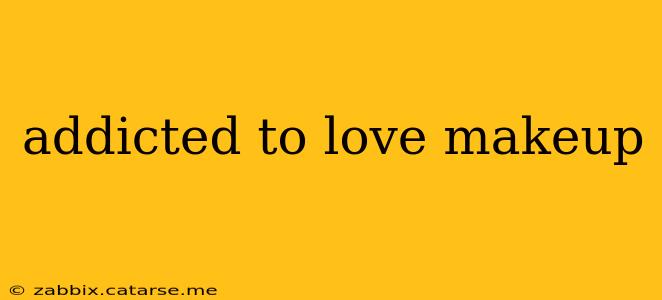For many, makeup is more than just cosmetics; it's a form of self-expression, a creative outlet, and a powerful tool for boosting confidence. But when does a love for makeup cross the line into addiction? This article delves into the complexities of this relationship, exploring the reasons behind the allure, the potential pitfalls, and how to maintain a healthy relationship with beauty products.
What is Makeup Addiction?
While there's no official clinical diagnosis for "makeup addiction," the term commonly refers to an obsessive preoccupation with makeup, characterized by excessive purchasing, hoarding, and a significant impact on daily life. This isn't simply about enjoying makeup; it's about the compulsive need to acquire and use it, often despite negative consequences. The core issue often lies in underlying emotional needs the individual attempts to fulfill through the act of buying and applying makeup.
Why Are People Addicted to Makeup?
The reasons behind this "addiction" are multifaceted and complex, often stemming from a combination of psychological and social factors.
Escape from Reality:
For some, makeup provides an escape from daily stresses and anxieties. The act of applying makeup can be a meditative process, offering a temporary distraction from life's challenges. The transformation it allows can boost self-esteem and provide a sense of control, albeit a temporary one.
Social Media Influence:
The pervasive influence of social media, particularly platforms like Instagram and TikTok, plays a significant role. Constant exposure to flawlessly made-up influencers and celebrities can fuel a desire to emulate their looks, creating unrealistic beauty standards and driving compulsive purchasing. The curated nature of these platforms often masks the time and effort involved in achieving these looks.
Sense of Control and Identity:
Makeup can provide a sense of control and allow individuals to express their identity. Experimenting with different looks and styles can be empowering and provide a sense of self-discovery. This can be especially beneficial for those who feel a lack of control in other aspects of their lives.
Underlying Emotional Issues:
In some cases, makeup addiction can mask deeper emotional issues such as low self-esteem, anxiety, or depression. The temporary boost in confidence provided by makeup may become a crutch, leading to an unhealthy dependence.
How to Tell if You Have a Makeup Addiction?
Several key indicators can help determine if your relationship with makeup has become problematic:
- Excessive Spending: Do you consistently spend more on makeup than you can afford?
- Hoarding: Do you have an overwhelming amount of makeup you rarely use?
- Neglecting Other Responsibilities: Is your preoccupation with makeup impacting your work, relationships, or other important areas of your life?
- Negative Feelings: Do you feel anxious, guilty, or ashamed about your makeup habits?
- Unsuccessful Attempts to Cut Back: Have you tried to reduce your makeup usage but been unable to do so?
How to Manage Your Makeup Usage?
If you're concerned about your relationship with makeup, several strategies can help you manage your usage:
- Mindfulness: Pay attention to your feelings and motivations behind your makeup usage. Are you using makeup to cope with stress or to feel more confident?
- Set Limits: Establish a budget and stick to it. Create a "no-buy" period to assess your makeup collection and identify any unnecessary items.
- Declutter: Get rid of unused or expired makeup. This can help alleviate feelings of overwhelm and prevent impulsive purchases.
- Seek Professional Help: If you believe underlying emotional issues are contributing to your preoccupation with makeup, consider seeking help from a therapist or counselor.
Is Makeup Addiction a Real Thing?
While not officially recognized as a clinical disorder, the compulsive behaviors and negative consequences associated with excessive makeup use align with characteristics of other addictive behaviors. The psychological impact and the disruption to daily life are crucial aspects to consider.
How Can I Stop Being Addicted to Makeup?
Addressing makeup addiction requires a multifaceted approach, combining self-awareness, lifestyle adjustments, and potentially professional help. It’s a journey that requires patience and self-compassion.
By understanding the underlying reasons behind the allure of makeup and implementing healthy coping mechanisms, individuals can cultivate a more balanced and fulfilling relationship with beauty products. Remember, makeup should enhance your natural beauty and boost your confidence, not control your life.
